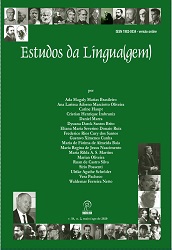From the executions of Cuitelinho to the problem of place of speech
DOI:
https://doi.org/10.22481/el.v18i2.7194Keywords:
Discourse analysis; Subject; Person; Identity.Abstract
The essay begins by making considerations about the grammar of "Cuitelinho". But, from a statement that avoids a verb from the original letter, a fact to which an interpretation is attributed, the essay enumerates and tries to interpret a set of phenomena evaluated as being of the same type, which suggest the distinction between what could be called a subject-position and an intrusion of the person in this position. Thus, the essay suggests, considering facts of a different nature with evaluations of different detail, that there are in vogue numerous arguments that question the division that seemed to be settled between subject (or author) and person.
Downloads
References
AUCHLIN, Antoine. Ethos e experiência do discurso: algumas observações. In: Mari, Hugo et al. (Org.). Análise do discurso: fundamentos e práticas. Belo Horizonte: Núcleo de Análise do Discurso – FALE – UFMG, 2001. p. 201-225.
DUCROT, Oswald. Esboço de uma teoria polifônica da enunciação. In: _____. O dizer e o dito. Campinas: Editora Pontes, 1987. Edição original: 1984.
FOUCAULT, Michel. O que é um autor? Lisboa: Passagens, 1997. Edição original: 1969.
FOUCAULT, Michel. A ordem do discurso. São Paulo: Edições Loyola, 1996. Edição 1971.
LABOV, William. A motivação social de uma mudança sonora. In: Padrões sociolinguísticos. São Paulo: Parábola Editorial, 2008. p. 19-62. Edição original: 1963.
LABOV, William. A estratificação social dos (r) nas lojas de departamentos na cidade de Nova York. In: Padrões sociolinguísticos. São Paulo: Parábola Editorial, 2008. p. 63-90. Edição original: 1972.
MAINGUENEAU, Dominique. Gênese dos discursos. São Paulo: Parábola Editorial, 2008. Edição original: 1984.
MAINGUENEAU, Dominique. Ethos e apresentação de si nos sites de relacionamento. In: _____. Doze conceitos em análise do discurso. 2010, p. 79-988.
MAINGUENEAU, Dominique. Discurso literário. São Paulo: Editora Contexto, 2005/2006.
MAINGUENEAU, Dominique. La biographie des philosophes dans une perspective d´analyse du discours. In: COSSUTA, Frédéric et al. La vie à l´oevre; Le biographique dans le discours phlosophique. Paris: Lambert-Lucas. pp. 21-36. 2012.
ØSTENTAD, Inger. Quel importance a le nom de l´auteur? in: Argumentation et Analyse du discours (en ligne]. Acessível em http://aadrevues.org/665. 2009
RIBEIRO, Djamila. O que é lugar de fala? Belo Horizonte: Letramento: Justificando, 2017.
Downloads
Published
How to Cite
Issue
Section
License

Estudos da Língua(gem) is licensed under a Creative Commons Attribution 4.0 International License.
Authors who publish in the journal Estudos da Língua (gem) agree with the following terms:
The journal Estudos de Língua(gem) maintains the copyrights of the contributions published. These rights include the publication of the contribution and make its content available for free through the portal.







